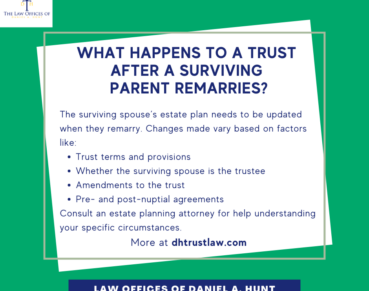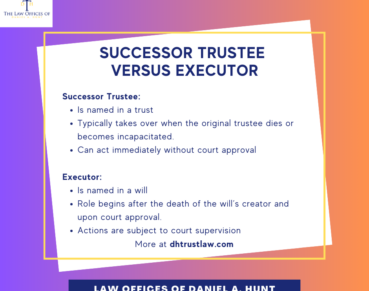Top Estate Planning Law Changes for 2023
Every year, our law firm updates our clients regarding changes in estate planning law that may affect them. Here are the top estate planning law changes for 2023.
Probate Cut-Off
One major change occurred last year after our regular annual updates in January 2022, so we’re including it here in our 2023 updates. The threshold for California probates has increased.
As of April 1, 2022, the threshold for a California probate increased from $166,250 to $184,500. This means if the total value of your assets is more than $184,500 upon your death, your estate will need to be probated in order for your heirs to receive an inheritance.
As for real estate, if you own any real property that is valued at more than $61,500 (previously $55,425), this will trigger a probate proceeding upon your death.
If your estate is worth more than that amount, a probate may be triggered upon your passing unless you have created a revocable living trust and transferred your assets properly into it.
Gift Tax Exclusion
The gift tax exclusion amount in 2023 has increased from $16,000 per individual ($32,000 per married couple splitting their gifts). The new amount for 2023 will be $17,000 per individual or $34,000 per couple. In other words, you can give up to $17,000 to as many people as you wish without those gifts counting against your lifetime exemption.
Federal Estate Tax Exemption
The Federal Estate and Gift Tax exemption has once again increased to $12.92 million per individual (or $25.84 million for a married couple), up from $12.06 million in 2022. This means that you can give away a total of $12.92 million of assets over the course of your life and at your death without owing any Federal Estate tax.
The IRS and Treasury have clarified that the government will not “claw back” gifts given between 2018-2025 that exceed $5 million, with respect to someone who dies in or after 2026.
However, under the 2012 Act, the $12.92 million exemption will end on December 31, 2025, and go down to $5 million. So if you have a large estate, be sure to make an appointment with one of our attorneys to discuss how this may affect you!
Corporate Transparency Regulations
The Corporate Transparency Act will become effective on January 1, 2024. This requires certain entities to disclose “beneficial owners” to the Financial Crimes Enforcement Network (FinCEN) by January 1, 2025. Entities that must meet this new requirement include LLCs, Corporations, and Limited Partnerships.
“Beneficial owners” are defined as any individual who directly or indirectly:
- Owns or controls at least 25% of the company.
- Exercises substantial control over the company.
- Are trustees of a trust, trust beneficiaries who are the sole recipient of income and principal, or a trust settlor with the power to revoke or withdraw all assets.
Anti-Isolation Restraining Orders Now Available
A new law, California Assembly Bill 1243, took effect on January 1, 2023. This new law expands the Elder Abuse Act to allow interested parties who had a personal, preexisting relationship with a vulnerable adult to seek anti-isolation restraining orders that would grant them the right to communicate with that person.
The Legislature found that some elder abusers took advantage of the isolating circumstances of the pandemic “by preventing trusted friends and family members from seeing or contacting a vulnerable adult.”
The purpose of the new law is to ensure that “these vulnerable adults are able to maintain important familial and social connections that they desire, and that a perpetrator does not cut off those relationships in an attempt to take advantage of the vulnerable adult.”
Judges will have to evaluate complex family situations to determine whether and how to intervene. An interested party can seek an anti-restraining order by filing a petition with the court.
AB 1243 also permits judges to determine whether “specific debts” were the product of elder abuse, although to seek damages would require litigation and a trial.
If you suspect that an elder may be a victim of intentional isolation and financial elder abuse, feel free to reach out to our firm’s litigation team.
2023 SECURE Act Proposed Regulations
If a surviving spouse or child receives a rolled-over IRA or annuity after your death, then they must liquidate it within 10 years. Starting in 2023, Mandatory Required Distributions are required each year in this scenario.
After the person dies, the survivor has five years to file a portability return with the IRS.
Additional Changes
- Bruno v. Hopkins (2022): In this case, after a father died, a daughter sued to demand a copy of the trust terms and then alleged that her mom and sisters forged the trust documents. Not only did she lose in court, but the court determined that she, as a trust beneficiary, had sought the trustee’s removal in bad faith. She was ordered to pay all of the attorney’s fees and costs for her mom and sisters to the tune of $925,000!
Beneficiaries take note: if you sue a trustee in bad faith, you may wind up paying your opponent’s attorney’s fees and costs!
- Logan v. Country Oak Partners, LLC (2022): In this case, a man named Charles Logan designated his nephew as his agent in an advance healthcare directive. When Logan was admitted to a skilled nursing facility, his nephew signed the admission agreement and a separate arbitration agreement on his uncle’s behalf.
Upon discharge 20 days later, Logan sued the facility for elder abuse, negligence, and more. The facility filed a petition to force him to attend arbitration because of the agreement his nephew had signed on his behalf, but the court denied the petition.
The sole issue on appeal was whether the nephew was authorized to sign the arbitration agreement. The court decided that the advance health care directive ONLY gave the nephew power to make health care decisions on behalf of the agent, so the arbitration agreement was invalid. Logan was still entitled to sue the facility and pursue a jury trial.Takeaway: An Advance Healthcare Directive only gives the agent power over healthcare decisions, NOT financial decisions such as arbitration agreements.
- Balisteri v. Balistreri (2022): In this case, a couple amended their revocable trust the day before the husband died, without getting the amendment notarized. The probate court deemed their amendment invalid since the trust required any amendment “be made by written instrument signed, with signature acknowledged by a notary public.”
Bottom line: Avoid DIY amendments. Always seek the help of an experienced estate planning attorney when making changes to your estate plan.
If you have any questions about these estate planning law changes or would like to schedule a consultation with one of our attorneys to discuss how they might impact you, feel free to call our office.
Law Offices of Daniel A. Hunt
The Law Offices of Daniel A. Hunt is a California law firm specializing in Estate Planning; Trust Administration & Litigation; Probate; and Conservatorships. We've helped over 10,000 clients find peace of mind. We serve clients throughout the greater Sacramento region and the state of California.




